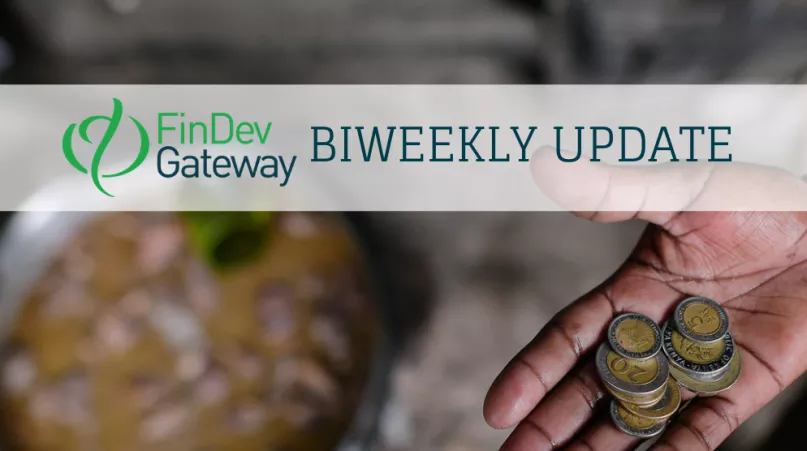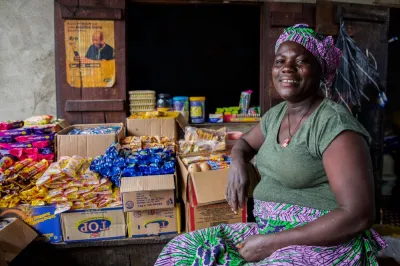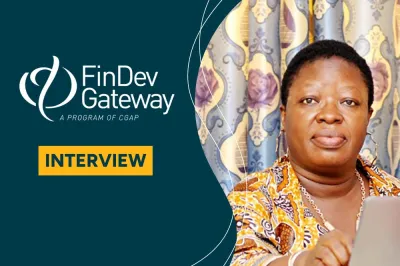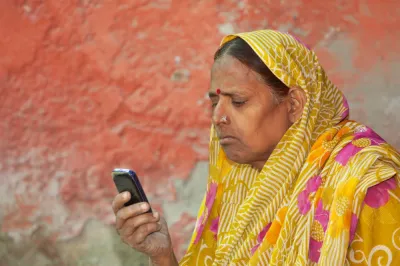FinDev COVID-19 Update | 22 Oct - 04 Nov 2020

FinDev Gateway has created this COVID-19 Update with the latest and most relevant knowledge resources for financial inclusion. Sign up to receive this update to your inbox.
If you have content to share in our COVID-19 update, please submit here or contact us directly.
Do you find the FinDev Update useful? Take a moment to let us know >>
Global Update
- The gender gap: Women have been disproportionately affected by the COVID-19 pandemic, and while governments have responded with support schemes, the gendered digital divide hampers their ability to reach the women who need it most. Women’s World Banking argues that fintechs are the key to women’s economic empowerment and recovery post-COVID-19, and presented the finalists in their Fintech Innovation Challenge at this year’s Making Finance Work for Women Summit. The upcoming FinEquity event, Crisis as an Inflection Point for Women 's Financial Inclusion, will provide an opportunity to further discuss solutions - such as this mobile app in Ethiopia - that help develop resilience, mitigate risks and accelerate progress for women’s financial inclusion.
- Remittances: The World Bank released its revised forecasts for remittances, which now predict a more gradual and prolonged decline extending into 2021. Many governments are considering and implementing policies aimed at helping boost remittances, such as cash assistance for migrant workers in the Philippines, easing know-your-customer requirements in Ghana, and waiving mobile money fees in Uganda. In Ethiopia, it is hoped that policy reforms to expand the telecommunications and financial services markets, as well as the recent demonetization, could help formalize remittance flows and strengthen remittance service providers.
- Moratoria: As a response to the economic impact of COVID-19, many countries implemented moratoria on microfinance loans to support financial institutions and borrowers. While the moratoria periods are only beginning to close, early research results indicate that moratoria are good for financial service providers, but have mixed results for clients, who often end up having to pay more due to interest accrual.
Asia
- In Bangladesh, 60 percent of garment industry workers received a digital salary payment in September, down from its peak of 77 percent in June, prompting some concern that the recent increase in digital payments will only be temporary. Digital financial operations among garment workers (remittances, loan repayments, intra-households transfers) decreased as well. As a comparison, pre-pandemic, digital salary payments were barely used (28 percent in April 2020).
- Remittances to Nepal are expected to drop by 12 percent in 2020, according to a recent World Bank report. In the Philippines, they are expected to decline by 5 percent, as a result of 300,000 migrant workers returning home by the end of year. In India, a 5 percent tax has been imposed on money sent overseas from India, but not on remittances sent to India.
- The Phillipine government’s Graduation program, implemented with support from ADB and BRAC, shows how the Graduation Approach can build poor households’ economic resilience and aid recovery from the economic impact of COVID-19. In July 2020, 76 percent of participants were still earning an income during lockdown and 75 percent used their savings, while only 20 percent took a loan.
Africa
Some articles and knowledge resources referenced in this section are in French.
- A recent World Bank report expects remittances to Sub-Saharan Africa to decline by 9 percent by the end of the year. To keep remittances flowing, Ethiopia is applying policy reforms to formalize them.
- Many Africans are shifting towards digital remittance services amid closed borders and travel restrictions. The digital money transfer service WorldRemit has reported a sharp increase in remittance services to Zimbabwe, with demand doubling over the last six months due to the number of cash collection points created during the pandemic.
- The UN World Food Program, in association with national and local government, launched a cash transfer program targeting 24,000 families living in informal urban settlements in Mombasa, Kenya. Each selected family, whose livelihoods were impacted by the pandemic, will receive $40 per month for a duration of three months.
- Results from the RECOVR survey in Zambia reveal that over 50 percent of respondents had to use their savings to pay for food, healthcare or other necessary expenses since February. 44 percent of households reported working when the survey was conducted (15 Jun - 6 Jul), versus 67 percent in February.
For more on Africa, check out the latest Portail FinDev Biweekly Update in French.
Latin America and the Caribbean
Most articles and knowledge resources referenced in this section are in Spanish.
- Peru is now sending out “payment cars” (“carritos pagadores”) to bring the COVID-19 stimulus bonus directly to recipients who have no bank account or digital wallet, in an initiative geared especially towards older adults or people with severe disabilities. In some remote locations, the stimulus may also arrive by payment boats, hydroplanes or helicopters.
- The Central Bank of Argentina approved the creation of “Transferencia 3.0,” a QR code payment system for banks and fintechs that will allow instantaneous and interoperable payments. The program aims to boost digital payments and financial inclusion in a country that had a strong preference for cash payments before the pandemic started.
- Remittances to Mexico reached an all-time high in September at $3.57 billion, an amount that represents $364 on average for recipient families, according to the Central Bank of Mexico. This continued growth is thought to be due to Mexican migrants working in sectors not heavily affected by the pandemic in the U.S., unemployment relief packages in the U.S. and migrants’ concerns for their family members affected even more strongly by the pandemic in Mexico.
- A CFI survey of MSME owners in Colombia found that two thirds of respondents would only be able to cover essential costs for a month or less if their households’ income dried up.
- Fundación Paraguaya and Taiwan International Cooperation and Development Fund joined forces to provide financing to more than 1,500 entrepreneurs and MSMEs in Paraguay that do not qualify for traditional loans. The initiative aims to help them maintain and strengthen their businesses during the economic crisis.
For more on LAC, check out the latest Portal FinDev Biweekly Update in Spanish.
Arab World
- Egyptian diaspora remittances hit a record high in the middle of the pandemic, contrasting sharply with global projections. The funds sent from Egyptians working abroad rose significantly in June 2020, by around 33.7 percent to $2.6 billion.
- Remittance inflows to Lebanon are expected to plunge 17 percent in 2020 because of the global slowdown resulting from the spread of COVID-19, according to the World Bank.
- MFI Baobab Tunisia and USAID launched the Sanad program to help 8,400 entrepreneurs heavily impacted by the coronavirus pandemic. The program will provide a financial support mechanism designed to meet the entrepreneur’s needs for maintaining and relaunching their activities.
- Egyptian fintech Raseedy, in partnership with SAIB Bank and Mastercard, launched the first independent licensed digital wallet in Egypt to provide inclusive digital financial solutions for underserved Egyptians, allowing them to transact safely during the coronavirus outbreak.
For more on the Arab world and resources in Arabic, check out the latest FinDev Update in Arabic.
COVID-19 Resources

COVID-19 Resource Hub
A collective space for the financial inclusion community to share experiences and lessons learned from the pandemic
FinDev Coronavirus Data Tracker
Data relevant for financial inclusion - find out who is tracking what

Blogs & Opinion
If you have a blog idea and would like to write for the FinDev Blog, please review our guidelines. We do not cross-post blogs that have been published elsewhere, but if you wish to share an existing blog post in our next FinDev COVID-19 Update, you can send it to us using our contact form.
Microfinance
Keeping Finance in the Family: How Intra-Family Accounts Can Help Low-Income Customers During COVID-19 – and Beyond
03 Nov 2020 | Anne Marie van Swinderen | NextBillion
What Is the Future of Microfinance? Q and A with Paul DiLeo
29 Oct 2020 | Paul DiLeo, Garrett Jaso & Deborah Drake | CFI-Accion
Moratoria During COVID-19: How Are They Working Out?
23 Oct 2020 | Elisabeth Rhyne & Denise Dias | CGAP
Remittances
Can Focused Policy Reforms Help Bring Back Remittances?
03 Nov 2020 | Eliamringi Mandari & Amani Itatiro | FinDev Gateway
COVID-19 and Migrant Remittances: Supporting This Essential Lifeline Under Threat
26 OCt 2020 | Wafa Aidi, Razaq Fatai, and Stephen Karingi | Brookings
Women and Fintech
Will the Pandemic Exacerbate or Mitigate the Digital Gender Gap?
02 Nov 2020 | Parul Tandon & Sonal Jaitly, MSC | FinDev Gateway
In Ethiopia, Prototyping a Mobile App to Support Women Entrepreneurs Facing the Pandemic
23 Oct 2020 | Fawah Ngeniform Akwo, Salman Alibhai, Sharmista Appaya & Rachel Coleman | World Bank
Women’s Economic Empowerment Is the Doorway to Economic Recovery and Growth Post-COVID-19; Fintechs Are the Key
22 Oct 2020 | Mary Ellen Iskenderian & Nithyasri Sharma | Women’s World Banking
Equal Access to Digital Technologies: A Key to Resilient Recovery
22 Oct 2020 | Mats Granryd & Mari Pangestu | GSMA
Digital Financial Inclusion
Focus on Colombia: G2P Payments in Response to COVID-19
26 Oct 2020 | Ana Maria Prieto | Women’s World Banking
Half a Year of COVID-19: What’s Next?
22 Oct 2020 | Daniela Ortega | Garment Worker Diaries
Socioeconomic Impact
COVID-19 and Forced Displacement in the Global South
27 Oct 2020 | Sarah Stillman | Berkeley News
COVID-19 and Saving Groups
26 Oct 2020 | Hugh Allen | Boulder Institute of Microfinance
Survey: China’s Small and Medium-sized Enterprises Rebounded After the COVID-19 Lockdown, But Economic Problems Linger
22 Oct 2020 | Xiaobo Zhang | IFPRI
Post-COVID Prognosis for Gig Workers in China: Slow and Steady Improvement
21 Oct 2020 | Coco Dong | BFA Global
Recent Publications
Do you have a publication to add to this list? Share your work on FinDev Gateway.
The Global COVID-19 Fintech Regulatory Rapid Assessment Study
World Bank, Cambridge Center for Alternative Finance | Oct 2020
Phase II: COVID-19 Crisis Through a Migration Lens
World Bank | Oct 2020
Building the Infrastructure for Digital Finance During COVID-19 and Beyond
Development Asia | Oct 2020
View All Publications Related to COVID-19 >
Webinar Recording
The Importance of Migrants' Remittances in a Time of Crisis
05 Oct 2020 | Parliamentary Assembly of the Council of Europe
View All Upcoming Events Related to COVID-19 >
News
The Pandemic Is Spurring Fintech Regulation Across the Globe
| Business Insider | Global
Singapore’s Buy Now Pay Later Firm Hoolah to Expand Operations Into Asian Markets
| Crowdfund Insider | Asia
COVID Crisis Highlights Urgent Need for Inclusive Insurance
| Microinsurance Network | Global
View All News Related to COVID-19 >
Quick Links:
FinDev Guide
About this guide
Published
Topics
Contributed by a global financial inclusion community member. Share your lessons learned
Write for usComments
Comments on this page are moderated by FinDev Editors. We welcome comments that offer remarks and insights that are relevant to the post. Learn More



Yemen has been taken many steps to face the pandemic of COVID 2019 especially with mobile money services. These steps was taken by Central Bank of Yemen with following steps :
1. CBY has issued a new regulations for introducing mobile money services by fintech companies. This regulation has issued by the governor of the bank NO. 01/2020 .
The regulation has allowed for fintech to introduce mobile money services with bank. the regulation has determined the requirements which have Fintech and banks should provide it to get the license for introducing the services of mobile money to public .
2. In meantime, central bank of Yemen with his responsibility to Face the pandemic of COVID 19 , it has given the permission for six companies which are specialized in mobile money services by issuing six license for them .
3. CBY has encouraged many banks to make a partnership with fintech companies for introducing the services of mobile money .
4. currently , Central bank of Yemen has preparing to create a united plan which has targeted the Yemeni citizens and the community . this plan will be implemented by Yemeni Financial sectors like :Banks, Yemen Microfinance Network, Mobile money companies . Telecoms companies .
5. CBY has trying to make the digital services are the substitute to be used especially with cashing the salaries for employee.
6. CBY has issued the license for Yemen National Switch to introduce it's digital services for public . The national switch will be ready to introduce many digital services by corporation with many local banks such following:
#TRF from bank account to bank account
# TRF from Cash account to bank account
#TRF from E-wallets account to bank account
#TRF from bank account to E-Wallets account
7. Yemen has the suitable infrastructure to be one of famous countries in mobile money services like Ethiopia, Somalian , Africa but it still has many problems, issues should be face it like: Political situation , the weakness of culture between the community about the digital services like mobile money services and lack of cash liquidity .
8.
Leave a comment